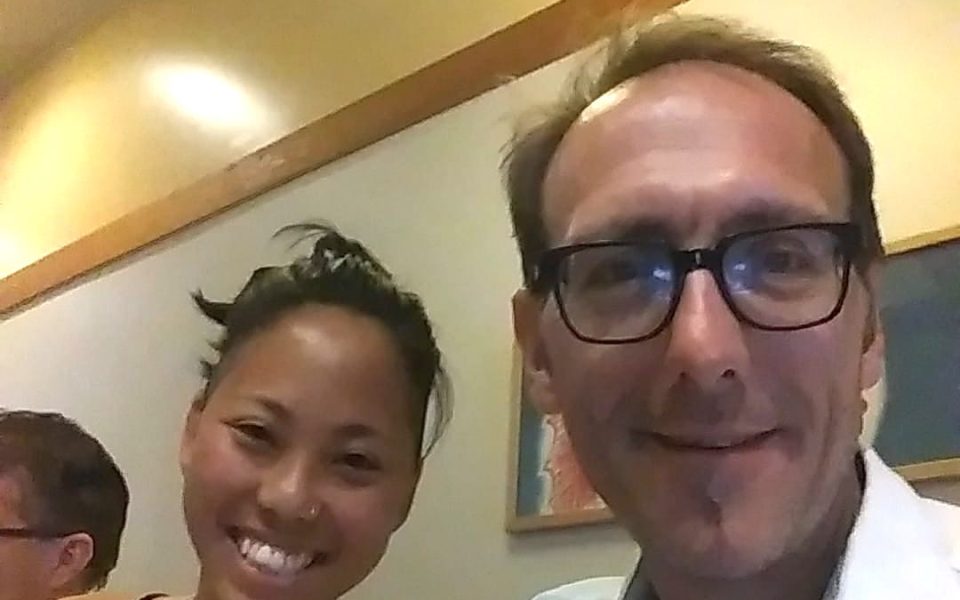You can’t really find it in North Carolina.
It’s salty and tangy and offers a bit of a kick at the end. You can eat it on its own, but I highly recommend eating it with freshly cooked white rice.
Mentaiko, or spicy pollock roe, is a rarity even in Japanese-owned restaurants in our state.
But in Amu, a little izakaya or Japanese style pub, next to our hotel in Boulder, it made the cut.
It looks kind of gross, to be honest. It’s pink and looks kind of like a chubby, severed finger slapped onto a plate. The membrane holding the thousands of miniscule eggs sometimes has fleshy veins that look like red flashes of lightning. It’s a popular dish in Japan and Korea, often eaten with pasta or rice, or for those brave enough, by itself.
Brian didn’t like it.
But I grew up eating the stuff. In fact, it used to be my favorite go-to lunch as a kid. Kind of like an American’s peanut butter-and-jelly sandwich. Easy, fast, delicious.
Amu also listed other childhood favorites of mine on their menu: porkbelly braised with onions, agedashi tofu in a warm broth, or grilled sea bass, so buttery that it’s hard to look at other fish the same way after you’ve had just one bite.

Growing up Japanese American in the South it was hard to find my favorite foods in restaurants. Even now, you’d have to go as far as Waraji in Raleigh to find proper Japanese food, or my mom’s kitchen. But in a town like Boulder, where the culture is vibrant and there is more ethnic food than a city twice its size, finding these dishes came pretty easily.
I didn’t feel like an outsider for an hour. The staff spoke, although basic, pretty decent Japanese and the other customers ordered and ate stuff that people in North Carolina would at the least, be confused by, and at the worst, reject entirely. It felt good to be in the company of people who didn’t treat me or my culture as foreign.
That’s kind of how the entire trip to Boulder felt like, really.
At this year’s Association of Alternative Newsmedia’s annual convention, hundreds of weirdos like us gathered at the Hotel Boulderado for three days. Eccentric editors, investigative journalists, creative art directors and driven sales people commiserated and celebrated with each other over the trials and tribulations of working in this industry. While we’re lesser known than the dailies, there are hundreds of papers just like us, scattered throughout the country, working tirelessly in our communities to tell the stories others won’t touch.
And it felt good.
It felt good to be understood for our struggles and triumphs. The men and women there would get that same look in their eyes when someone mentioned another paper closing or a big media company buying up more publications. We laughed when snarky jokes were made when coming up with headlines for hypothetical stories or designing shocking but intriguing covers.
It’s a type of camaraderie that I hadn’t really experienced and understood until I was in the thick of it all.
Being a part of a community is essential to personal growth and development as a human being. I’m lucky enough to be a part of at least two that have shaped my identity in ways that have forever changed who I am and how I view myself and how I interact with the world.
And it’s an even better feeling when there are others to share that feeling with.
Join the First Amendment Society, a membership that goes directly to funding TCB‘s newsroom.
We believe that reporting can save the world.
The TCB First Amendment Society recognizes the vital role of a free, unfettered press with a bundling of local experiences designed to build community, and unique engagements with our newsroom that will help you understand, and shape, local journalism’s critical role in uplifting the people in our cities.
All revenue goes directly into the newsroom as reporters’ salaries and freelance commissions.


Leave a Reply